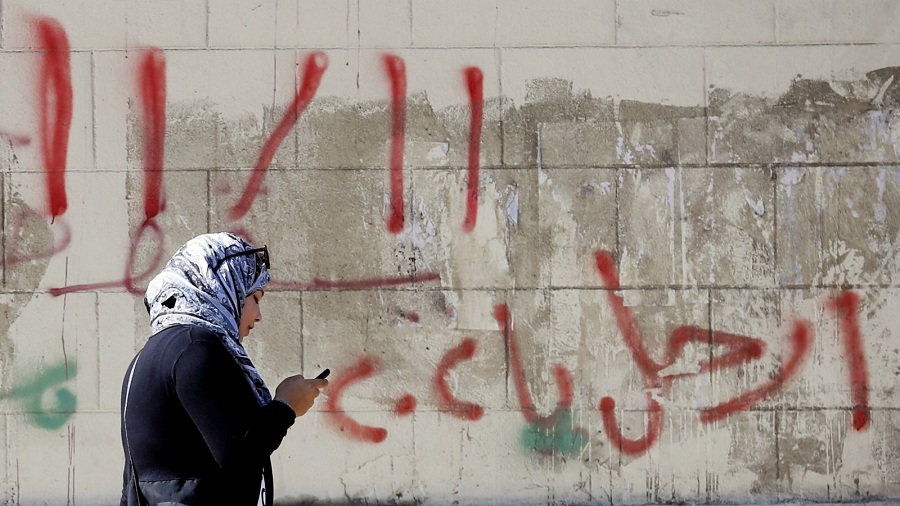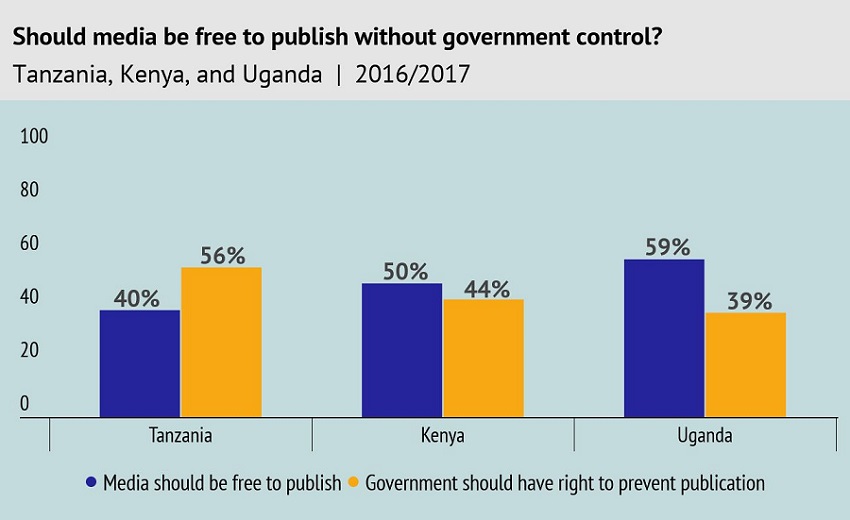WITNESS RADIO MILESTONES
Media “switch-off” in Kenya: a looming threat to pluralist society
Published
7 years agoon

Guest post by Grace Mutung’u (@bomu)
On Tuesday, January 30, the Communications Authority of Kenya switched off three main television stations and a local language channel ahead of a mock swearing-in ceremony for opposition leader Raila Odinga. A day later, the “switch-off” was extended indefinitely as the government proceeded with investigations into the role of the media in broadcasting the swearing-in ceremony, which the government considers an illegal act. Okiya Omtata, a human rights activist, obtained court orders requiring that TV broadcasting be restored, with no more interference until the case is heard and a legal determination is reached. One week later, the government restored two of the four stations.
Regardless of the government’s rationale for cutting off TV broadcasting, it’s a disproportionate measure that interferes with the right to free expression, which includes the right to access information. This right is protected under the law.
One would think that this type of broad shutdown would be met with furious condemnation. But the rebukes have come mostly from media freedom veterans and organizations. In perhaps an indication of changes in foreign policy, the international community has taken a “balanced” diplomatic approach. The public wants vindication, as they have time and again raised concern over the media’s cosy relationship with the state. Should a media company’s purportedly dirty hands prevent us from defending its freedom? If we stay silent, could this TV switch-off lead to a full internet shutdown — despite the government’s pledge to keep the internet on?
For many years, Kenyans congregated in homes, entertainment venues, and other public spaces to watch the 7 o’clock news. In past eras, news content was largely from the executive point of view. In spite of the controls, people appreciated the news for its value in broadcasting information, regardless of the opinion it was clothed in. Fast forward to the present situation with Raila Odinga, leader of opposition, reading an oath before a crowd at Nairobi’s main public space, Uhuru Park.
Public curiosity about the Uhuru Park rally was high. Parts of the event were shared online and despite the fact that attention has shifted to the TV shutdown, analysis of the rally is ongoing. The government contends that by airing “an act of subversion,” the media is an accessory.
Public opinion is divided on the merit of Raila Odinga’s oath, with U.S. foreign policy reflecting support for the Kenyan government’s view that it is destabilizing for the nation. The three media houses that were shut down have taken cover under the constitutional guarantee of press independence.
Kenya’s Constitution protects speech online and off. The Constitution is relatively young, having been passed in 2010 with approval from 67% of Kenyan voters. It protects both the right to freedom of expression (art. 33), “which includes freedom to seek, receive or impart information or ideas,” and freedom of the media (art. 34), affirming people’s right to broadcast without interference or penalty based on the viewpoint or content transmitted. Both of these rights are subject to limited exceptions. On the policy side, Kenya is one of 30 governments in the Freedom Online Coalition, a partnership of states “working to advance internet freedom” that has spoken out against network disruptions.
A point of contention in the debate is whether the media has acted in good faith. Take for instance how and why the switch-off story became known in the public sphere: news editors were in a meeting with the government and they disagreed on coverage of the Uhuru Park event.
For its part, the public has warned the press about the dangers of an opaque relationship with the government. Examples range from the widely discussed media high tea at Statehouse in 2013, the creation of the government advertising agency, the running of government promotions during the 2017 election period, and the drafting of “conflict-sensitive” guidelines for the election period. Not to mention that the media framed the election as a binary between the ruling coalition, Jubilee, and the opposition forces under Raila Odinga, thereby contributing to polarization of the society. This is not to say that all of these policies were wholly wrong, but to point out that they were made with little or no public involvement, as if they were purely business and not public-interest decisions. These are not inclusive, multi-stakeholder processes.
Among urban populations, switching off four television stations does not appear to have had made much of an impact yet. This might be because there are alternative news sources, including the content from the four stations that is available online. But the problem with the switch-off is not just what it reveals about the relationship between the media and the public, but what it says about how our society is organized and how the rules are made.
In the past, Kenya went through a “one party era,” where the executive was in total control of policy, law, and practices, and everyone was expected to toe that line. Now we have a dispensation that envisages a plural society with a separation of powers. The executive should not be the last word on what information should be available in the public sphere and a dispute involving some content should not be resolved in a manner that affects whether the public can make choices in the marketplace of ideas.
For those who depend on “free-to-air” channels (which you can watch without paying for a subscription), the switch-off significantly limited their access to information. In one online discussion about the switch-off, a young Kenyan lamented that those without internet access were calling their friends and relatives in Nairobi to get a picture of the ongoings at Uhuru Park. A journalist from one of the switched-off stations discussed how his programs, which cover government technical and vocational institutions, were cancelled because of this action. Those who work under contract for content producers are also out of work during the switch-off.
Outside the broadcast media, businesses that provide access to information — for example, internet service providers (ISPs) — are undertaking economic, tech, and regulatory risk assessments, simulating scenarios in case they get a government directive. What happens if the switch-off targets online media? Will ISPs push back?
It may be that government had legitimate reasons for the action it took — that’s not clear — but even if it did, switching off four television stations goes too far for fixing the problem it’s trying to address. Restrictions like this on free expression should be targeted and necessary to achieve a legitimate aim. The message the switch-off has sent to the Kenyan people, allies, prospective investors, and the world, is that under this administration, one can never be sure of what will happen, even when a freedom is clearly spelled out in the Constitution.
This switch-off is therefore bad for our society. As Article 19, Amnesty International, and others stated, the blocking is “unacceptable” and curtails press freedom. We add that the switch-off fails to respect the values of openness and inclusivity that are essential to internet policy making, and threatens the new balance of powers in pluralist Kenya.
While we call upon the media to improve its relationship with the public, let us defend our freedom to access information and ideas, consider them, and judge for ourselves whether they are good for us.
Related posts:

 Ugandan internet activist, legal team insists on constitutional interpretation
Ugandan internet activist, legal team insists on constitutional interpretation
 “Closing Space for Civil Society and Media in East Africa: Forging a Collaborative Response”
“Closing Space for Civil Society and Media in East Africa: Forging a Collaborative Response”
 Manipulating Social Media to Undermine Democracy
Manipulating Social Media to Undermine Democracy
 Ruling party leaders want social media platforms indefinitely closed.
Ruling party leaders want social media platforms indefinitely closed.

You may like
-


More African governments are trying to control what’s being said on social media and blogs
-


Uganda ‘feels’ Tanzania’s tightening grip on social media
-


Access Now calls for global independent audit of Facebook data practices
-


Do East Africans still want a free media?
-


Exclusive: Facebook Opens Up About False News
-


Privacy Vs Free Expression: Global News Media Implications Of The EU’S General Data Protection Regulation (GDPR)
WITNESS RADIO MILESTONES
Top 10 agribusiness giants: corporate concentration in food & farming in 2025
Published
3 weeks agoon
June 19, 2025
Today a handful of agribusiness corporations have consolidated unprecedented control over the world’s food supply, with devastating consequences for farmers, consumers and the planet. A new report by ETC Group and GRAIN examines the state of corporate concentration in six sectors critical to agriculture: commercial seeds, pesticides, synthetic fertilisers, farm machinery, animal pharmaceuticals and livestock genetics.
Corporate consolidation is increasing in most of these sectors and four of them– seeds, pesticides, agricultural machinery and animal pharmaceuticals– now meet the definition of an oligopoly, in which four companies control more than 40% of a market. Concentration can be even higher at the national level, as is the case with synthetic fertilisers.
Top findings from the report include:
- Oligopolies dominate key sectors: Bayer, Corteva, Syngenta, and BASF control 56% of the global commercial seeds market, and 61% of the pesticides market.
- Profiteering amid global crises: Agribusiness giants have exploited crises like the Ukraine war and the COVID-19 pandemic to inflate prices. Fertiliser companies, for instance, saw revenues soar by 57% from 2020 to 2023, with some accused of price gouging.
- Digital and biotech expansion: Corporations are rapidly integrating AI, gene editing, and digital platforms into agriculture through partnerships with Big Tech companies. These technologies enable data extraction from farmers, facilitate carbon credit schemes, and tighter control over food systems—while raising concerns about biosafety, privacy, and corporate monopolies.
Source: grassrootsonline
Related posts:

 A corporate cartel fertilises food inflation
A corporate cartel fertilises food inflation
 Food inflation: The math doesn’t add up without factoring in corporate power
Food inflation: The math doesn’t add up without factoring in corporate power
 African governments are giving in to corporate pressure and undermining local seed systems – report
African governments are giving in to corporate pressure and undermining local seed systems – report
 The United Nations Food Systems Summit is a corporate food summit —not a “people’s” food summit
The United Nations Food Systems Summit is a corporate food summit —not a “people’s” food summit
WITNESS RADIO MILESTONES
Land grabbers evict 360,000 Ugandans in 2024
Published
8 months agoon
November 20, 2024
A staggering 363,021 Ugandans were displaced due to forced land evictions between January and June 2024, according to a new report by Witness Radio Uganda.
The report documented 90 cases of land evictions during this period, with nearly four incidents occurring weekly, affecting over 15,126 people and threatening 5,060 hectares of land nationwide.
The Central region was the epicenter, recording 52 eviction cases, followed by 24 in the Western region, eight in the Northern region, and six in the Eastern region. Alarmingly, the report estimated that 2,160 Ugandans face eviction daily, with 723 hectares of land at risk of being grabbed every day.
VIOLENCE AND HUMAN RIGHTS VIOLATIONS
Despite government promises and directives from President Museveni to halt evictions, land grabbers have routinely ignored these orders, often resorting to violence. Armed security forces, private militias, and police were reported to have carried out the majority of the evictions.
Of the reported cases, 37 were enforced by armed gangs on behalf of evictors, 25 involved Uganda Police, five were carried out with the participation of UPDF soldiers, and four were linked to private security companies.
“The egregious levels of impunity exhibited by land grabbers have left communities defenseless, creating an environment where their human rights are trampled without consequence,” said Jeff Wokulira Ssebaggala, country director of Witness Radio Uganda.
He called for accountability and justice, warning that the unchecked power of influential individuals and entities leaves marginalized communities vulnerable and without recourse.
DRIVERS OF EVICTIONS: INDUSTRIALIZATION AND LAND-BASED INVESTMENTS
The report identified the government’s push for industrialization and land-based investments as the primary drivers of forced evictions. Land is increasingly targeted for oil and gas extraction, mining, agribusiness and tree plantations for carbon offsets. While some of this land is already under development, other parcels remain vacant but are guarded by military personnel and private security firms.
Ssebaggala emphasized that industrialization must balance economic development with the protection of smallholder farmers’ rights to land and food security.

TRAGIC STORIES
The report highlighted harrowing cases that underscore the human toll of forced evictions. In Nakasongola, smallholder farmer Dan Ssebyala was ambushed and killed by armed men following a confrontation over disputed land. The district has become a hotspot for violent evictions involving absentee landlords and powerful investors.
Ismael Bwowe, a disabled father of 20, recounted how his land was confiscated after he demanded fair compensation. He faced intimidation, arrests and false charges from state authorities, including being accused of robbing an influential individual. Bwowe claimed that Total Energies offered legal support and representation on the condition that he accept their compensation terms.
“I refused,” he said, adding that the pressure to relinquish his land remains intense. The report underscores the urgent need for reforms to address forced evictions, ensure accountability, and protect the rights of vulnerable communities. Without meaningful intervention, Uganda risks deepening inequality and undermining the livelihoods of smallholder farmers who are essential to the country’s food security.
FAMILY JAILED AMID LAND DISPUTE
The plight of Richard Ssebagala, his wife Prossy Namande, and their relative Anania Ngabirano, residents of Kabubu-Kabongo village in Nansana Municipality, Wakiso district, highlights the human toll of Uganda’s ongoing land disputes. The family spent nine months in prison following their arrest on January 10, 2024, under controversial circumstances.
ARREST AND ALLEGATIONS
The arrests occurred at 1am, during a raid by officers from Luweero police station. Police reportedly banged on the doors and forcefully detained the family, accusing them of aggravated robbery. However, the family believes the arrest was a tactic linked to a land dispute with Benon Ntambi, a man who allegedly grabbed their land.
Before the arrests, Ntambi had reportedly destroyed crops, including tomatoes, potatoes, and bananas, on the contested land. While the family was incarcerated, a new building was constructed on their land, which is now occupied, raising further questions about the motivations behind their detention.
CALLS FOR JUSTICE
The case has drawn attention from Witness Radio Uganda, which has urged the government to take immediate action to address land grabbing and illegal evictions. The organization emphasized the need to strengthen land laws and protect vulnerable communities from abuses.
It also called for greater accountability in institutions such as the Uganda Police Force, the army and land registries, which are often accused of corruption and favoritism toward the wealthy.
“The government must prioritize justice for victims of illegal evictions and address systemic corruption that leaves the poor defenseless against land grabbers,” Witness Radio Uganda stated.
BROADER CONTEXT
This case underscores the broader issue of land conflicts in Uganda, where vulnerable families are often caught in disputes with powerful individuals or entities. Advocacy groups warn that the failure to address these issues not only erodes public trust but also perpetuates inequality and injustice.
As the government faces mounting pressure to act, the story of Ssebagala and his family serves as a stark reminder of the urgent need for reforms to protect land rights and ensure justice for those impacted by land disputes.
Source: The Observer
Related posts:

 Local land grabbers evict villagers at night; foreign investors cultivate the same lands the next day
Local land grabbers evict villagers at night; foreign investors cultivate the same lands the next day
 Uganda: Land-grab victim communities will join counterparts in commemorating the 2024 International Day of Struggle Against Industrial Plantations.
Uganda: Land-grab victim communities will join counterparts in commemorating the 2024 International Day of Struggle Against Industrial Plantations.
 Mubende Land Grab: Witnessradio.org presents another petition to Land Inquiry Commission, Wants All Titles being used to evict Natives to be Investigated
Mubende Land Grab: Witnessradio.org presents another petition to Land Inquiry Commission, Wants All Titles being used to evict Natives to be Investigated
 A Nullity? Ugandans Query Constitutional Land Amendment Bill
A Nullity? Ugandans Query Constitutional Land Amendment Bill
WITNESS RADIO MILESTONES
Uganda: Community members violently evicted by security forces, allegedly related to EACOP; incl. co. responses
Published
8 months agoon
November 18, 2024
On 10 February 2023, more than 2,500 community members were forcibly evicted from their land in Kapapi village in Hoima district in Western Uganda by security forces, receiving no compensation or resettlement.
Witness Radio, an Ugandan non-profit organisation comprised of human rights investigative journalists, lawyers, and social workers, said that many people were wounded during the eviction, women were raped, and houses were destroyed.
Witness Radio said its investigations found that this eviction occurred to clear the path for the Tilenga feeder pipeline, part of the East African Crude Oil Pipeline (EACOP). According to Witness Radio, in 2022 Kapapi community members’ land was surveyed for the Tilenga pipeline and people were informed they would be compensated for the land. Instead, they were forcibly evicted, which Witness Radio allege was backed and financed by Swacoff Intertrade Company Limited, known to TotalEnergies. They also allege that guards from private security company Magnum Security were involved. Witness Radio has also found that dozens of local farmers who were evicted have been arbitrarily arrested and face criminal charges.
The Business & Human Rights Resource Centre invited TotalEnergies, Swacoff Intertrade Company Limited, and Magnum Security to respond to the allegations. TotalEnergies responded and stated that no land eviction activities had been carried out by or on behalf of TotalEnergies EP Uganda (TEPU) and EACOP Ltd and that none of the affected people are Tilenga or EACOP Project Affected Persons. Swacoff responded and said that the company has never engaged in forceful eviction of any sort and asserts that these allegations are completely false. Their full responses and rejoinders from Witness Radio are available below. Magnum Security did not respond.
Related posts:

 Uganda: NGO claims Agilis Partners & Great Seasons violently evicted locals to pave the way for agribusiness; Agilis Partners responds
Uganda: NGO claims Agilis Partners & Great Seasons violently evicted locals to pave the way for agribusiness; Agilis Partners responds
 A son of the community defender is shot dead, another critically injured in a retaliatory attack by security guards evicting locals off their land to give way to large-scale sugarcane growing.
A son of the community defender is shot dead, another critically injured in a retaliatory attack by security guards evicting locals off their land to give way to large-scale sugarcane growing.
 Breaking: Criminal trial for seven community defenders opposed to EACOP/Tilenga project forced land eviction has been fixed.
Breaking: Criminal trial for seven community defenders opposed to EACOP/Tilenga project forced land eviction has been fixed.
 Uganda: CSOs claim Agilis Partners forcibly evicting local communities to pave way for agribusiness; company did not respond
Uganda: CSOs claim Agilis Partners forcibly evicting local communities to pave way for agribusiness; company did not respond

Seizing the Jubilee moment: Cancel the debt to unlock Africa’s clean energy future

Activism on Trial: Despite the increasing repressive measures, Uganda’s EACOP protesters are achieving unexpected victories in the country’s justice systems.

Communities Under Siege: New Report Reveals World Bank Failures in Safeguard Compliance and Human Rights Oversight in Tanzania

A decade of displacement: How Uganda’s Oil refinery victims are dying before realizing justice as EACOP secures financial backing to further significant environmental harm.

A decade of displacement: How Uganda’s Oil refinery victims are dying before realizing justice as EACOP secures financial backing to further significant environmental harm.

Govt launches Central Account for Busuulu to protect tenants from evictions

Activism on Trial: Despite the increasing repressive measures, Uganda’s EACOP protesters are achieving unexpected victories in the country’s justice systems.

Top 10 agribusiness giants: corporate concentration in food & farming in 2025

Innovative Finance from Canada projects positive impact on local communities.
Over 5000 Indigenous Communities evicted in Kiryandongo District
Petition To Land Inquiry Commission Over Human Rights In Kiryandongo District
Invisible victims of Uganda Land Grabs
Resource Center
- LAND GRABS AT GUNPOINT REPORT IN KIRYANDONGO DISTRICT
- RESEARCH BRIEF -TOURISM POTENTIAL OF GREATER MASAKA -MARCH 2025
- The Mouila Declaration of the Informal Alliance against the Expansion of Industrial Monocultures
- FORCED LAND EVICTIONS IN UGANDA TRENDS RIGHTS OF DEFENDERS IMPACT AND CALL FOR ACTION
- 12 KEY DEMANDS FROM CSOS TO WORLD LEADERS AT THE OPENING OF COP16 IN SAUDI ARABIA
- PRESENDIANTIAL DIRECTIVE BANNING ALL LAND EVICTIONS IN UGANDA
- FROM LAND GRABBERS TO CARBON COWBOYS A NEW SCRAMBLE FOR COMMUNITY LANDS TAKES OFF
- African Faith Leaders Demand Reparations From The Gates Foundation.
Legal Framework
READ BY CATEGORY
Newsletter
Trending
-

 SPECIAL REPORTS AND PROJECTS4 days ago
SPECIAL REPORTS AND PROJECTS4 days agoActivism on Trial: Despite the increasing repressive measures, Uganda’s EACOP protesters are achieving unexpected victories in the country’s justice systems.
-

 NGO WORK1 week ago
NGO WORK1 week agoCommunities Under Siege: New Report Reveals World Bank Failures in Safeguard Compliance and Human Rights Oversight in Tanzania
-

 SPECIAL REPORTS AND PROJECTS3 mins ago
SPECIAL REPORTS AND PROJECTS3 mins agoSeizing the Jubilee moment: Cancel the debt to unlock Africa’s clean energy future